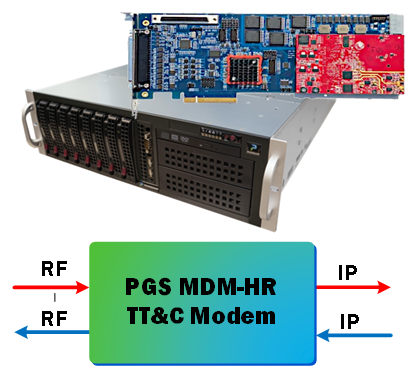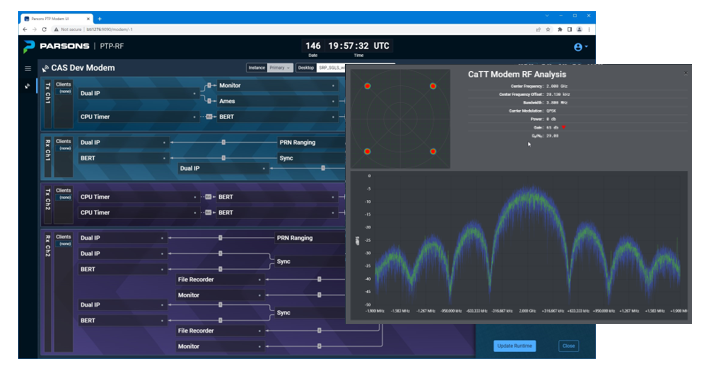An Economical, Scalable, and Unified Communications System
Bridge the entire analog and digital boundary with our economical, scalable, unified space communications system. The Mission Link Modem High Rate (MLM-HR) represents the next generation of integrated solutions for ground systems.
What Is The Mission Link Modem (MLM) And How Does It Work?
The MLM is a space communications system that combines a proven software framework with state-of-the-art digital signal processing components to deliver a full range of user-configurable, uplink and downlink RF-to-IP transmission and data processing capabilities.
How Does The MLM Support Telemetry, Tracking, And Commanding (TT&C) For Spacecraft?
The MLM-HR utilizes the infrastructure and capabilities of the L/S-Band MLM to implement a high-rate solution. The MLM-HR receives satellite IF transmission in a 720 MHz, 1.2GHzor 2.4 GHz signal. The MLM-HR demodulates and extracts the telemetry data from an IF signal. The Test Modulation Uplink allows the system to perform loopback testing to ensure data reliability and error correction decoding are operating within defined parameters. MLM provides a VITA-49 Radio Transport (VRT) network interface.
Key Features of Mission Link Modem
- Wide range of supported modulation schemes and signal characteristics
- Performance within 1 dB of theory for typical waveform configurations
- CCSDS Application ID (APID) Packet Processing
APID Data Extraction - Programmable data segmentation based on time interval in APID time fields.
- Report Statistics: Total Frames Received, Total Error Frames (RS Uncorrectable), Frame on each VCID, Each APID (valid and error)

What Is The Frame Sync And CCSDS Processing For MLM?
The frame synchronization subsystem processes extracted telemetry baseband data from the downlink signal. It performs frame synchronization and de-randomization utilizing the RS Forward Error Correction (FEC) decoding and correction for ensuring reliable delivery of data. The system makes a data quality determination and provides the relevant RS Flags to the system to request retransmission of data packets. The CCSDS VC Processor filters the data by Virtual Channel (VC) and Application ID (APID) unique to each spacecraft. The APID processing also has a reporting capability to provide operational statistics on total frames received, total uncorrectable frames, and VCID and APID frame and packet counts.
The MLM’s flexibility allows for local or remote control from a highly flexible graphical user interface including, a full-featured remote interface API for remote control, scripting, and automation.
How Does The Mission Link Modem Deliver Data?

The MLM-HR is fully user-configurable to send real-time telemetry acting as a TCP/IP server or client. Data can be selected by VC Data Unit (VCDU) for each port or connection. The MLM-HR also provide data playback by VC sending selected VCDUs to each client.
Robust Platform Architecture
Based on a robust, enterprise-grade server architecture to provide component-level redundancy and continuous operational reliability, the MLM system is highly scalable and can be expanded to include additional interfaces and increased storage capacity.
Features Of Mission Link Modem
- Pseudo-randomization and de-randomization
- Reed-Solomon encoding and decoding
- Convolutional/Viterbi encoding and decoding
- CRC checksum generation and verification
- CCSDS Conventional (version 1) and AOS (version 2) Transfer Frame processing
- CCSDS VCA and Bitstream service processing
- Fully configurable VCID and APID filtering and routing
- CCSDS, TDM, and ESA packet processing
- Database-driven telemetry decommutation and engineering unit conversion
- Configurable multi-mode file playback
- Segmented and multi-file recording
- Automatic time-tagging and aging of recorded files
- Fully configurable PRBS generation and verification
- Fixed and user-provided pattern generation & verification
- Single- and multi-bit burst error simulation
- AWGN and user-provided noise simulation
- Bit and packet error rate calculation
Modulator Specifications
| Parameter | Value |
|---|---|
| Output Level | 0 to -50 dBm in 0.5 dB steps |
| Center Frequency | 720MHz to 2.4GHz IF: Wideband Interface card |
| Modulation | BPSK, QPSK, OQPSK 16APSK |
| Convolutional Encoding | CCSDS 101.0-B-6 Rate ½. ¾ and 7/8, Dual CE. |
| Matched Filtering | I&D and Root-Raised Cosine |
| PCM Bit Rate | 1 Mbps to 200Mbps (BPSK), 400 Mbps (QPSK), 600Mbps (8PSK), 800Mbps (16PSK/16APSK) |
| PCM Signal | NRZ-L/M/S, Differential NRZ |
| PCM Input | TCP/IP and UDP/IP |
| Convolutional Encode | A, B, Invert A, Invert B, Swap A/B |
| Unwanted Emissions | <-50 dBc, 0 to -20 dBm output |
| Carrier Sweep Range | +/-1 MHz (Max) |
| Carrier Sweep Rate | 175 kHz/s (Max) |
| Reference | Internal or External 10 MHz |
| Carrier Offset | 0 to +1 MHz |
Demodulator Specifications
| Parameter | Value |
|---|---|
| Input Ports | 1 |
| Carrier Frequency | 720MHz to 2,4GHz IF: Wideband Interface card |
| Input Levels | 0 dBm to -50 dBm |
| Demodulation | BPSK, QPSK, OQPSK 16APSK |
| Matched Filtering | I&D and Root-Raised Cosine |
| Minimum Measurement Capabilities | Frequency, Power Level, Doppler Rate, Eb/N0, Lock Status |
| PCM Decoding | PCM Decoding |
| PCM Bit Rate | 1 Mbps to 200Mbps (BPSK), 400 Mbps (QPSK), 600Mbps (8PSK), 800Mbps (16PSK/16APSK) |
| QPSK, 8PSK, 16-PSK, 16-APSK Ambiguity Solving | Viterbi Decoding (Single/Dual Decoder, Separate Decoders on I&Q channels), Diff QPSK Decoding, Frame Synchronization |
| Viterbi Decoding | CCSDS 101.0-B-6 Single Viterbi Decoding Max Rate: 250Mbps |
| Acquisition Range | +/-1 MHz (Max) |
| AGC Time Constant | 0.1, 1, 10, 100 or 1000 ms |
| Carrier Loop Bandwidth | 0.03, 0.1, 0.3, 1 and 3% of symbol rate |
| Doppler Rate | <10 kHz/s (for loop bandwidth = 3kHz) |
| Acquisition Threshold | Eb/N0 < 3dB |
| Carrier Acquisition Time | 1s (typical) |
| BER Degradation | <3 dB for the listed data rates |
| Decoding | VRT |
| Bit Sync Acquisition Range | +3% of symbol rate |
Contact Us
For more information about the Mission Link Modem (MLM), our space communications system, please fill out the contact form.
*Parsons complies with all applicable Trade Compliance regulations. Some of Parsons products may require an authorization from the U.S. Government before they are exported.
Related Products
Signal Conversion Systems ↗
The icCON series of signal converters includes a variety of configurations to satisfy a wide range of signaling requirements.
Programmable Telemetry Processor (PTP) ↗
The PTP is a versatile, modular telemetry and command front-end processor for use in remote tracking stations and satellite operations centers.
Space Access ↗
We provide multi-manifest flight systems and launch integration capabilities to operationalize access to space for small space systems.